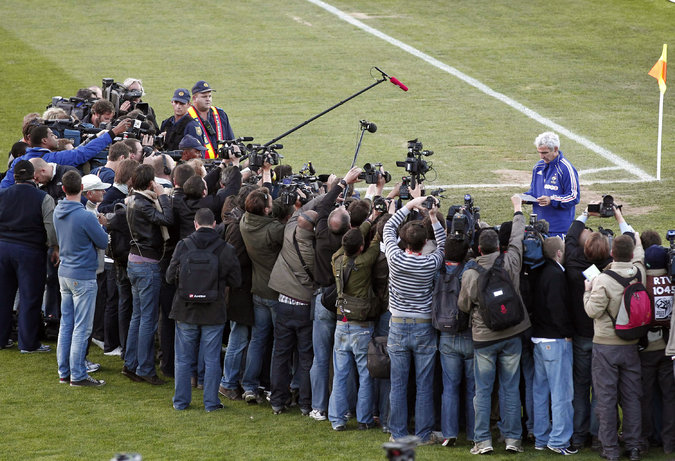Four years ago, Les Bleus, the French national soccer team, went on strike in South Africa. The incident capped the team’s self-destruction in the 2010 World Cup. In the aftermath, the players were called undereducated “PlayStation junkies” who were too individualistic to serve the nation.
Much has changed, yet today the French hesitate to re-embrace the team. A poll conducted for the magazine France Football found that only 20 percent of French people surveyed in late April had a positive view of Les Bleus.
This is vastly different from attitudes in 1998, when France won the World Cup and the team symbolized a bright future.
Why the French remain disenchanted with their team, which plays Switzerland in Brazil on Friday, is rooted in culture. French dissatisfaction with Les Bleus is an antisoccer backlash, fueled by the behavior of certain players and amplified by the news media. The team’s losing record since 2002 has contributed to the disillusionment, as have the country’s socioeconomic difficulties.
“Antisoccer backlash” sounds odd, but it explains much about the present attitude toward Les Bleus.
Sport in France is not held in as high esteem as the intellectual or academic world. This is a peculiar phenomenon for a country that produced Pierre de Coubertin (Olympics) and Jules Rimet (World Cup), forefathers of modern sports.
“The French have prejudice when it comes to sport,” said Jérôme de Bontin, a former general manager of the Red Bulls and a former president of A.S. Monaco. De Bontin experienced soccer culture on both sides of the Atlantic. He explained that in France, professional soccer was long stigmatized as a working-class, sterile environment.
This began to change because of televised games and winning teams like St.-Étienne in the 1960s and 1970s. Soccer culture started to take root. The excitement around the 1980s Platini generation — anchored by Michel Platini, Alain Giresse, Jean Tigana and Luis Fernández — stoked broader interest. It helped that Les Bleus were a winning team for the first time since their third-place finish at the 1958 World Cup.
The 1998 win legitimized French soccer and made it part of the cultural landscape. Today, soccer is the nation’s most popular sport. Yet its rapid commercialization since 2000 refueled French prejudice. Labor issues and financial pressures contributed to a negative perception of soccer’s commercial success.
“It became pretty striking,” de Bontin said, “that you were better off being a successful actor or singer than a successful soccer player Unblocked Games.”
The large salaries earned by young players were and remain contentious in a country proud of its socialist tradition. Laurent Courtois, who grew up and played professionally in France, acknowledged that “having 20-year-old kids winning fortunes doesn’t help.”
Daniel Jeandupeux, a former professional player and coach, said the image of Les Bleus had deteriorated because some young players “do not always have the behavior best adapted to their new social status.”
Courtois agreed, saying that academics were often sacrificed for soccer. Consequently, young players did not have the space to mature out of the public eye.
This was a problem in an age of increased news media scrutiny of soccer and its stars. The on- and off-field antics of individual players, including accusations of divalike behavior and charges of hiring under-age prostitutes, were magnified. This was considered un-French in a country that prized the private lives of public figures.
Yet any critique was muffled at the turn of the millennium. Les Bleus were adored; they were champions.
“The heroes became stars that nobody could scratch,” Jeandupeux said.
After 2002, Les Bleus were no longer untouchable. The team’s performance became politicized, and public opinion soured.
France has contended with a multitude of problems over the past decade, including high youth unemployment, unrest in the troubled suburbs and the continued rise of the far-right-wing National Front. These challenges were compounded by the global economic crisis.
At such times, Jeandupeux said, “differences are less acceptable” and “the public image of Les Bleus is influenced by racism when the team does not win.”
Soccer becomes a convenient scapegoat. But is the antisoccer backlash tied to racism?
Soccer historically assimilated players of different ethnic backgrounds. In the 1930s, Raoul Diagne and Larbi Benbarek, two non-Caucasians, played for France, the first European country to integrate its national team. For decades, Frenchmen of different races and beliefs contributed significantly to Les Bleus’ successes. Contending that racism affected the team’s image ignores this tradition.
“Fifteen or 20 years ago,” de Bontin said, “some of the negative debate about soccer could undoubtedly be attributed to racist sentiments.”
This is no longer the case, in large part because of the 1998 team’s popularity. Courtois and others emphasized that there was no racism among teammates, but many acknowledged that it existed within society at large.
The French antisoccer backlash is more a cultural reaction to the sport’s commercialization. It’s a response to certain players’ acting flagrantly un-French and the news media prism that scrutinizes such behavior. The record of Les Bleus made it easier to criticize soccer, the system and the players.
There are signs that the soccer bashing may be abating. When Les Bleus were backed into a corner against Ukraine during the qualifying playoffs in November, the French stood by them. At the Stade de France, where 15 years earlier a different generation of players made history, fans lustily cheered Les Bleus to a 3-0 victory.
The win helped revive a sense of optimism and gave the team a blank slate. France’s performance in Brazil will test the public’s willingness to re-embrace Les Bleus.
An article on June 20 about the roots of France’s disenchantment with its men’s national soccer team misstated the history of minorities who played for England’s national soccer team. Frank Soo, who was half Chinese, played for England in the 1940s; it is not the case that England “did not field a player of color until Viv Anderson in 1978.”
